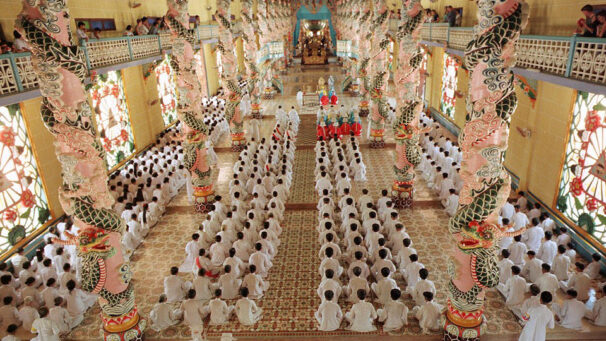
The United States Commission on International Religious Freedom (USCIRF) has put out its report for 2022. In it, the USCIRF attacks Vietnam, claiming religious freedom is not protected there. The USCIRF recommends labeling Vietnam as a “country of particular concern”, or CPC.
As People’s Word reported last year, the repeated claims about the lack of religious freedom in Vietnam are baseless allegations used to vilify the socialist country. To better understand the situation and the gravity of USCIRF’s suggestion, it’s important to understand the history of this commission and its makeup.
In 1998, seeing itself as the world’s hegemon, the United States government passed the International Religious Freedom Act of 1998, which created the USCIRF. The new body was empowered to research and report on the state of religious freedom in every country around the world—every country, that is, except for the United States, the one country that the United States government actually has authority over.
The USCIRF issues a yearly report and recommends that the U.S. Secretary of State label countries it judges to be lacking religious freedom, as “countries of particular concern.” Such countries are then subject to sanctions of various sorts.
From its inception, the USCIRF has been criticized as a tool of cultural imperialism. It has also been repeatedly accused of spreading a Christian agenda and of holding a specifically anti-Muslim and anti-Hindu bias.
The USCIRF is made up of as many as 10 commissioners, although at the moment there are only nine. Among its current members are Nadine Maenza and Tony Perkins. Maenza is the president of “Patriots Voice,” a right-wing, conservative Christian non-profit group, founded by former Republican Sen. Rick Santorum. Perkins, a fundamentalist Christian, is head of the anti-LGBTQ hate group “Family Research Council” and has reportedly worked with David Duke, infamous for being a leader of the Ku Klux Klan.
This is the body the U.S. government claims has the right to evaluate and judge the religious freedoms of other countries.
In the USCIRF’s report on Vietnam, it acknowledges that religious freedom is protected by the Constitution of Vietnam. However, it points to a clause in the constitution that allows certain freedoms to be suspended when national security is at risk, using it as a reason to claim that religious freedom is therefore not actually protected in Vietnam.
All countries on Earth have a right to protect their national security. In fact, the United States also suspends religious freedoms in the name of national security. If the Islamic State terror group tried to set up an institution in the United States and recruit new members, this would be deemed a threat to national security and its actions would not be protected as religious freedom.
Why is the United States holding Vietnam to a different standard than it holds itself? Why is Vietnam being told to sacrifice its security by the United States when the United States wouldn’t do the same?
Another part of the USCIRF’s report highlights a 2018 law passed by Vietnam’s National Assembly that requires religious organizations to register their existence with the government. This law was enacted to protect Vietnamese citizens from scams and abuse. There were a number of cases where someone claiming to be teaching one religion or another would con people out of their life savings or trick people into servitude.
The law requiring registration of legitimate religious institutions creates a database where Vietnamese people can check whether an organization they are interested in is legitimate or not. There are numerous religions practiced throughout Vietnam, from traditional Vietnamese religions, to Buddhism, to various Christian faiths, to Islam. None of these religious groups have had any issues following the registration system.

The report claims that smaller religions such as Cao Dai are persecuted. Yet anyone can visit Cao Dai temples and the Cao Dai Holy See is located in Tay Ninh, Vietnam, and practices freely. In fact, the beauty of Cao Dai houses of worship makes them popular sites for tourists that visit the region.
Given that the claims made by the USCIRF do not line up with the reality in Vietnam, and given what is known about the USCIRF, its role, and its makeup, it is clear that this body’s report on religious freedom in Vietnam is pushing a political agenda.
For anyone that has followed the history of the United States over the last century, it becomes clear that the report is a continuation of an old pattern. The USCIRF is still spreading anti-Communist propaganda that claims Communists and countries governed by Communist Parties are anti-religion. And now they want to threaten the people of Vietnam with sanctions to help spread these lies.
The true crime here is not being committed by the Vietnamese government. Rather it’s the cultural imperialism of the United States—a big, rich country—which is targeting a smaller socialist country and trying to bully it into capitulating and following its will. One would think that the United States government would have learned by now that when they try to bully Vietnam, the venture ends in failure.










